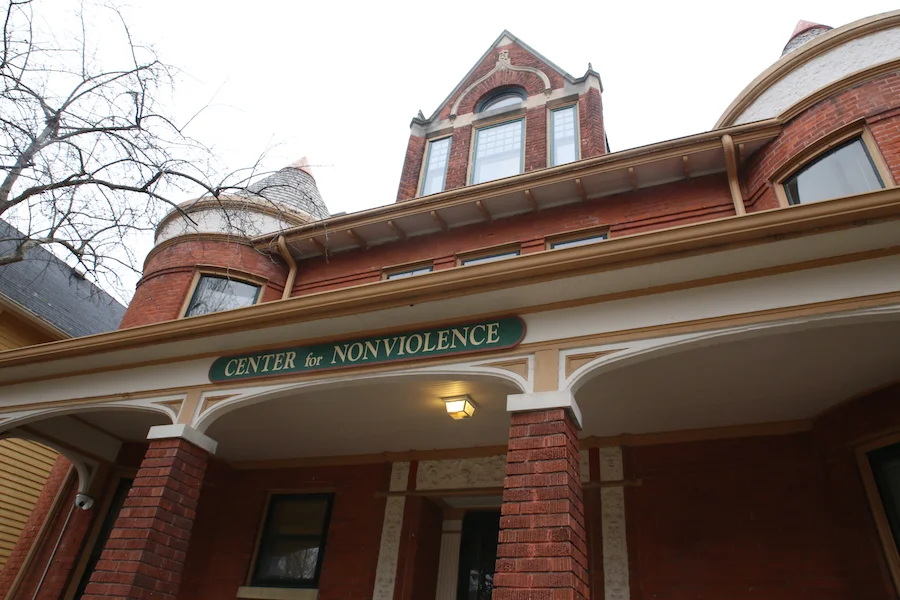The Complexities in Reporting Sexual Assault

The Center for Nonviolence (CNV), 235 West Creighton Ave., is not usually what CNV facilitators Nicki Meier and Maria Hogle called “the first line of defense,” after a sexual assault for a victim, who, having decided to seek help, will first call the police or a sexual treatment center.
The nonprofit, incorporated in 1981, primarily facilitates support groups for domestic abuse survivors and perpetrators who’ve been court ordered to attend the sessions, and serves as a navigator through the legal pathways for a sexual assault victim after the fact, in addition to providing counsel.
But the center does have contingencies in place when the first call does come, and, according to Meier, a sexual assault victim, more than likely, has already walked through the doors of the CNV. Based on her four-year tenure at the center, Meier estimated that more than half of the members in the center’s support groups have been sexually assaulted or abused, in some form, by someone familiar. “So, whatever we talk about is applicable to someone who has been sexually assaulted.”
It’s worth noting that heterosexual men and non-binary individuals are also sexual assault victims. And sexual assault or abuse does not always mean rape.
Meier, a victim of sexual assault herself, then personalized that estimated statistic. “This is just anecdotal, but I would say 95% of the women I know have been sexually assaulted. And I know very few people who have reported it to the police.”
The realities surrounding reporting sexual assault, specifically with rape, make it difficult for a victim to come forward; it has a lot to do with a natural instinct for protection and self-preservation. “People are in survival mode after a rape,” Meier said. “Brain science proves it. Part of your brain that rationalizes shuts down and the primitive part of your brain takes over.”
The first 24 hours are critical after a rape. “If you can get to safety within the first hour [after a rape], the chances of developing full PTSD drastically decreases,” Meier said.
Safety isn’t contacting the police, who will require a victim to immediately relive the assault by describing it in detail. Nor is it a hospital visit for medical examination with a stranger who will administer a rape kit. “Safety becomes going home and not telling somebody what happens.”
“One of the things that almost never gets talked about is that when rape and sexual assault happen,” Meier said, “it’s primarily within dating relationships or within marriages. It’s not usually some random person you never met before.”
Cases of known assailants further complicate the issue of reporting sexual assault, as a victim is less likely to inform on a friend, family member, or a fellow member of a marginalized group.
When rape is reported, the system, bureaucratic by design, does not have the tools and training inherent to empathize with a sexual assault victim. The system is less equipped for cases dealing with individuals from marginalized populations, like if you’re undocumented or a citizen from a country where elders handle conflict between couples and whose cultural mores don’t acquiesce to understanding or reporting rape.
Members of the LGBTQ community are also obstructed by the system. “When we went to get a protective order for sexual assault, the judge was so uncomfortable with sex talk he couldn’t look him in the eye.”
Meier and Hogle related a case about a young woman whose rape case didn’t make it beyond the prosecutor because a video surfaced of the victim fist-bumping the accused after her assault and raised questions about how someone can be friends with her rapist. “Even before it gets to the judge, there are people along the pipeline who get to determine [the victim’s fate],” Hogle said.
All of the above are reasons why a victim would wait decades to come forward. The MeToo# movement represents the cultural shift needed to support individuals to come forward and dictate change. “You have to hear stories of individuals to really understand.”
This article is first in the series about sexual assault and abuse. To contact the Center for Nonviolence, 235 West Creighton Avenue, Fort Wayne, Indiana 46807, call 260.456.4112, or hit up their website at CenterForNV.org.
